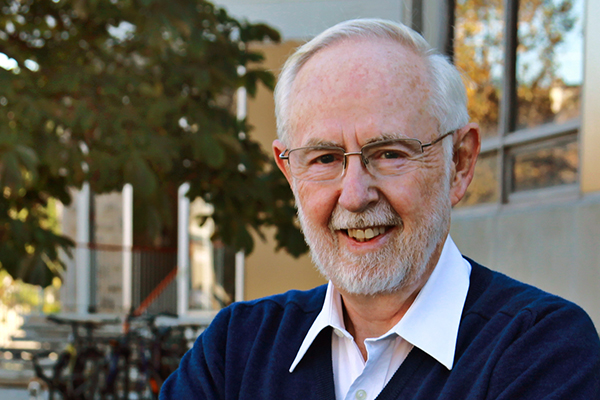Research award renamed after Queen’s University Nobel Laureate
Arthur B. McDonald Fellowships will recognize early-stage academic researchers

The Natural Sciences and Engineering Research Council of Canada (NSERC) has named a national prize in honour of Queen’s University Nobel Laurate Arthur McDonald.
Queen’s University Nobel Laurate Arthur McDonald has been honoured by the Natural Sciences and Engineering Research Council of Canada (NSERC) with a national prize in his name.
The Arthur B. McDonald Fellowships will recognize early-stage academic researchers in the natural sciences and engineering and support them to enhance their research capacity, so that they can become global leaders in their field. Worth $250,000 over two years, these awards were previously known as the EWR Steacie Memorial Fellowships and 10 have previously been awarded to Queen’s researchers including John Smol, Troy Day, Ahmed Hassan, and Peter Boag.
Unlike NSERC’s other prizes, which recognize previous research accomplishments, the McDonald Fellowship supports ongoing and future research and therefore comes with an additional grant of up to $180,000 to the winner’s university to fund a replacement for the winner’s teaching and administrative responsibilities.
“This is a tremendous honour from NSERC,” says Dr. McDonald. “I am particularly pleased because these fellowships will support early-stage academic researchers at a critical point in their careers. I know that there will be wonderful results in future from these creative young Fellows who will be given time and resources to pursue an innovative new idea.”
Joining Queen’s in 1989 as a professor in the physics department, Dr. McDonald worked as the director of the Sudbury Neutrino Observatory (SNO), the world’s deepest underground laboratory. The SNO team discovered that neutrinos – sub-atomic particles considered the basic building blocks of the universe – change from one type to another on their journey to Earth from the sun. This finding confirmed that these fundamental particles have a finite mass and that the current models for energy generation in the sun are very accurate.
For his research efforts, Dr. McDonald was named the co-winner of the 2015 Nobel Prize in physics for SNO’s research into neutrinos.
“The Queen’s community and Canadians continue to be inspired by the work of Dr. McDonald and his collaborators in helping us understand the fundamental building blocks of the universe,” says Kimberly Woodhouse, Vice-Principal (Research). “Throughout his career, Dr. McDonald has been a mentor and advocate for early-stage researchers across disciplines, and his name being attributed to this award is very fitting.”
A second Nobel Laureate, Donna Strickland also had an NSERC award named in her honour. The NSERC Donna Strickland Prize for Societal Impact of Natural Sciences and Engineering Research will be awarded annually to an individual or team whose outstanding research has led to exceptional benefits for Canadian society, the environment and/or the economy.
Learn more about Dr. McDonald’s Path to the Nobel.
Note: This article originally appeared in the Queen's Gazette.

